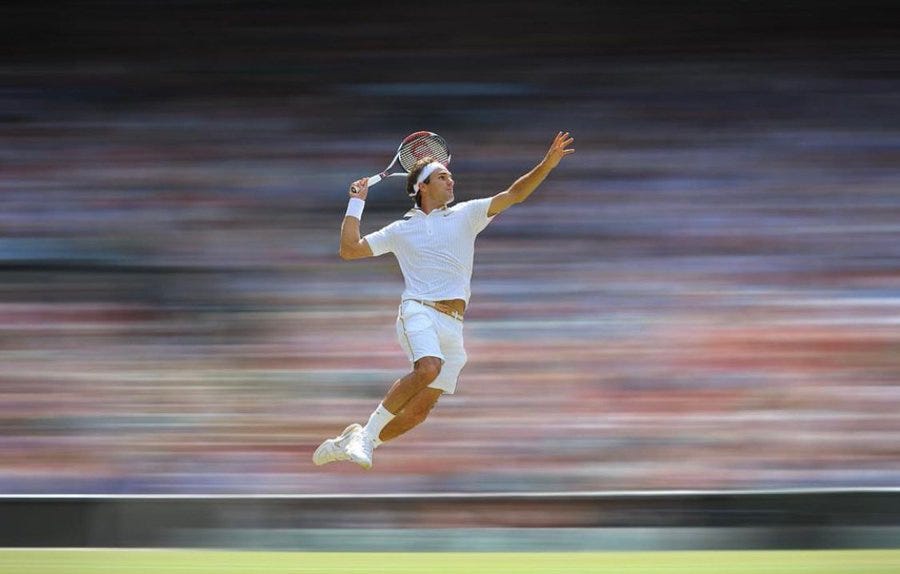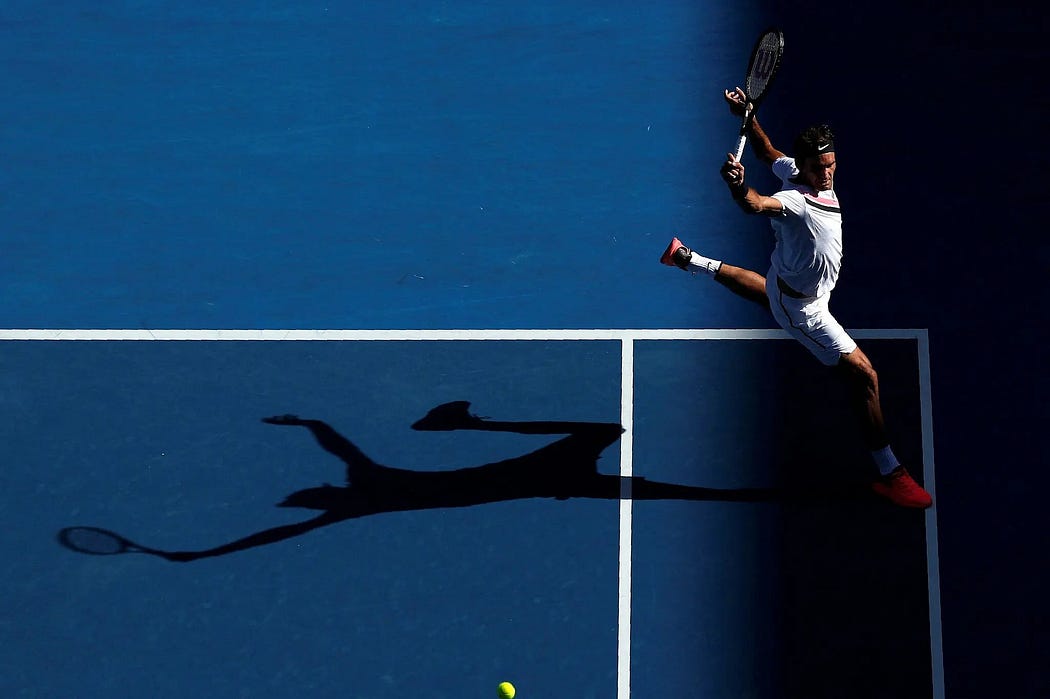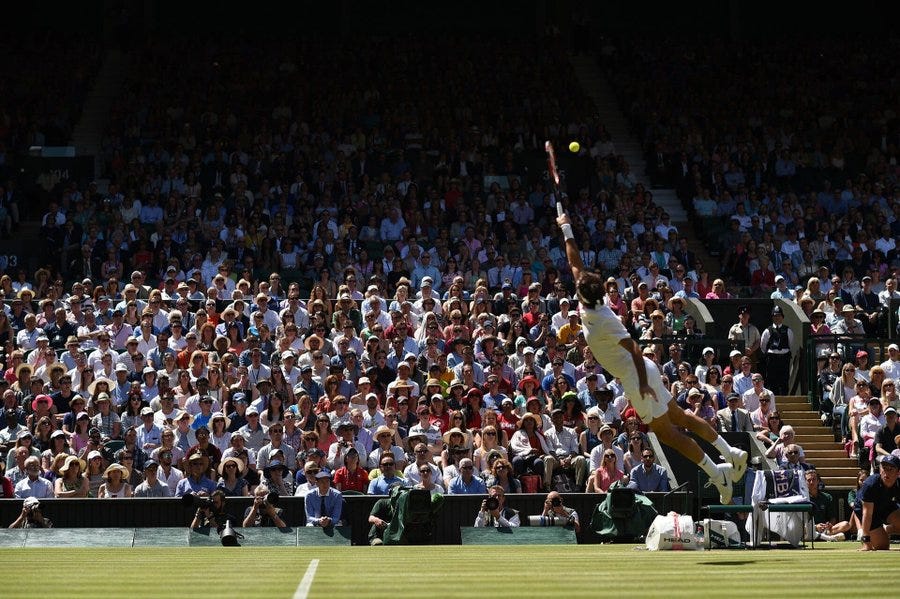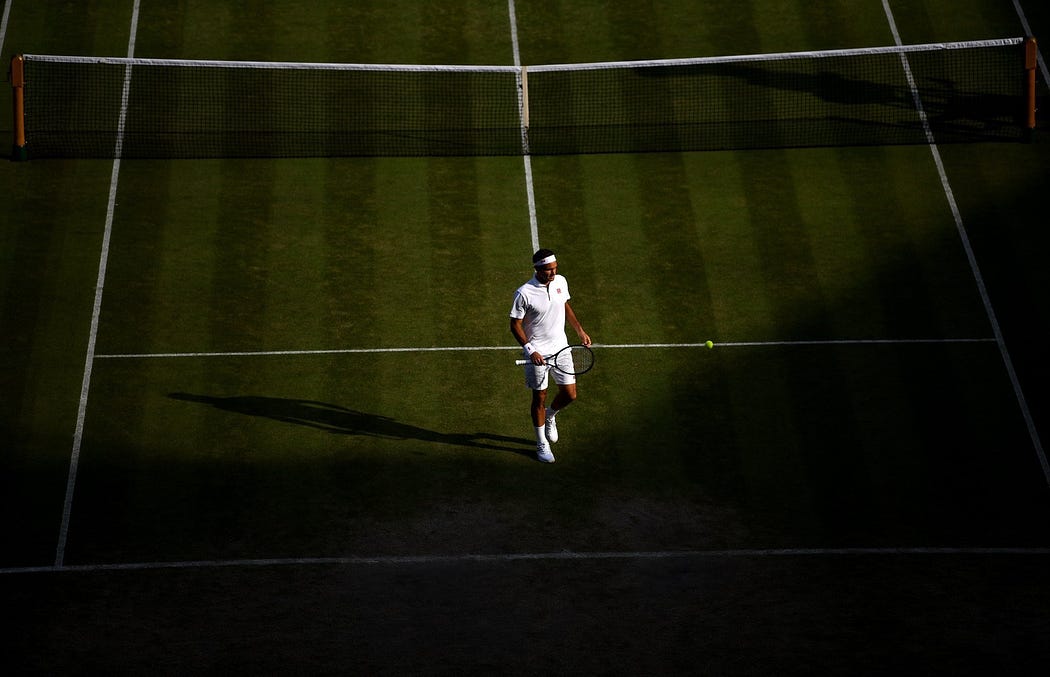An Ode to Elegance
As we know it is easiest to learn languages as a child. I learnt tennis (as a viewer) much ahead of cricket. We got our first TV in May 1980, a Dyanora B/W. A few weeks later, I happened to see the greatest tennis match before 2008, between a certain Bjorg and McEnroe on the trusted Doordarshan. I still have vague memories of my dad oohing-aahing at critical moments. Cricket followed much later — not until the 1983 cricket world cup.
Those initial years of tennis watching took shape of proper fandom when a 17 year lad emerged on the scene in 1985. You can carbon-date a person if they say their favourite sportsperson growing up was Becker. The burst of energy, the vibrancy, the power literally shocked and excited the establishment and the young ones simultaneously, which is a tough thing to do. Sticking posters on walls, staying up late, tracking records etc became a full time extra-curricular activity. Becker slowly faded away at the age of 24–25 and with that we also moved out of our adolescence and became busy with academics and cracking exams. That ran parallelly with what can be called a lost decade of tennis. Despite the best efforts of Sampras, Agassi, et al tennis took a backseat, not just for me, but for audiences in general.
The thawing of the freeze happened circa 2001, with a 4th round match between a pony-tailed Swiss 19 year old and the reigning king, Sampras. A lot of us long time tennis fans sat up with a puzzled brow and widened eyes. It is easy to say that we saw greatness then, but atleast we knew that we were in the midst of a rare talent.
The crowning of Roger Federer happened at the same Centre Court two years later and thus began a 20 year long admirable run for tennis as a sport. Records, tournaments, slams, tears followed for Federer in a continuous stream for the next many years. Federer’s stats during his prime were mindboggling — but soon came new players in the form of Nadal and Djoker who slowly took over his mantle, producing three of the greatest rivalries in tennis and matches of a supremely high quality.
I used to switch the TV on and off during these tense matches — to prevent my nerves being shredded. Case in point 2008 and 2019. I remember following the message boards at Tennis.com in 2008 Wimby final. TMF and TBR fans set new records for messages (Tennis.com fans would remember the acronyms), multiple threads being opened because of the message overload. That single match resulted in a fascinating book in itself — Strokes of Genius — by John Wertheim which is a highly recommended read.
Too often Federer’s brilliance is reduced to some lob or drop shot or tweener. It would be felt silly even by Federer himself. You don’t praise a poem for a pun. For a long time, until he started ageing, Federer rarely played the drop shots as he always felt that it was not a shot, but an interruption of a shot and graceless, going against his natural elegance. For me — it is not much about his shots as about his movement — to the net, across the baseline, his jumps for an overhead shot, his speed without effort, he was more a figure skating or a ballet artist (if you were to put a gun to my head and ask me to pick One shot — it would be the backhand down the line in the fourth set tiebreak at the 2008 Wimby final, Nadal serving for the Championship at 8–7).
Every key sportsperson or artist (both refer to the same person here) needs a writer to canonise him and David Foster Wallace did that early on in what still remains one of the most influential pieces of tennis writing. Wallace’s seminal “Federer as Religious Experience” was a key marker in Federer’s elevation to the pantheon and especially so as it was so early in Federer’s career. Wallace also gave a lovely speech called This is Water (can be heard on Youtube) where he says “Everybody worships. The only choice we get is what to worship.”. With apologies to REM — Federer almost made lose my ir-religion.
I used to regret that I did not have kids earlier, atleast my kids would have seen Federer play in his prime. Federer, listening to his admirers, extended the life of a regular tennis player by almost a decade. Earlier, even a top tennis player would peak by 26–27 years and then by 31–32, they would retire. I had seen that across Bjorg (who retired even earlier), McEnroe, Becker, Edberg and even Sampras. Federer too reached the pinnacle and by 28, he had already won 15 Slams. Over the last 12 years, he was just won five more. But he has consistently been at the top, winning a lot of non-Slams, making a lot of finals/ semis and challenging the leaders. And more importantly my kids got to see a genius at play, and in a cinematic trope, see their dad ooh and aah like his dad before him. Tennis was just not used to seeing players win slams at 35–36 years or win Slams after they had kids (leave aside four of them). The last hurrah that we got to see between 2017–19 was a glorious resurgency.
It would be impossible to evaluate Federer without referring to the holy trinity including Djokovic and Nadal. They are like the rock, paper, scissors of tennis — and they are so distinct as players that we know who is playing what role in that analogy. Federer was the paper in that trilogy — and the pen being mightier etc. he wrote his own book about longevity, grace off and on the court (the silliness of that 2009 Wimby outfit excluded), his eloquence across languages etc. Though we used to feel that the problem with the Sampras era of the 90s was the boring play, it was more to do with the lack of rivalries, the lack of a momentum towards a goal (Fed chasing Sampras and then Nadal chasing Fed and Djoker doing the same with Nadal). If Federer was not pushed and in turn push Nadal and Djoker to greater heights, his excellence would be unheralded, that backhand notwithstanding.
I have never seen any sportsplayer be the home favourite everywhere — whether it be against Murray in London or even against Nadal in his adopted home ground at Roland Garros or against Agassi on the Arthur Ashe court. When people cheer on a player despite their own home players, that signifies greatness. When you turn your toughest rivals to invest so much of their own lives in you that it moves them to tears, that is greatness. Federer singlehandedly elevated the sport of tennis and led it through its golden period and increased the marketability and its aura to make it one of the most popular sports worldwide.
He was the largest sporting megastar on earth — leaving sportpersons from basketball, football or cricket with their regional audiences far behind. He got passionate fans across all genders and age groups — creating a new breed called superfans who followed him around the world, creating fan boards and their own fan families. Especially among women, Federer created a fanbase which was unprecedented. His smooth unflappable play, his vulnerability and tears, his brooding good looks and his touch with young and old alike made him win the ATP Fans Favourite award for 19 years running, even in years when he hardly played due to injuries.
“Why do I love him? I don’t know, I just love him. There is something about Roger which just tugs at the heartstrings. I don’t know what it is, I can’t say exactly, but he gets to me. Maybe it’s because one of my sons idolizes Roger…it’s almost as though Roger could be my son….I could see that Roger was going to lose, and I just couldn’t watch any more. I didn’t want to feel what I was going to feel. I hardly know him. I’m not a stalker, I promise you.” — that’s just an 18 Grand Slam winner Chris Evert.
Chris Evert is speaking for a lot of women and men too.
It would be churlish to compare the holy trinity at this moment of bromance between the three — but I would view it like this. Will there be a player like Djoker — definitely. Will there be another player like Nadal — probably. And would there be someone like Federer — unlikely.
Federer’s retirement is not about him, but about us. I guess, there will be some genius who might emerge a decade or two later, if at all…but we will not be the same…we will not be in the prime of our youth to show the same kind of passion or energy (to see late night and early morning matches) or to have endless discussions and arguments with strangers. This is the end of an era not just for tennis but also signals a dimming of the light for many of his admirers who may never get to see another genius in their lifetimes.





Comments